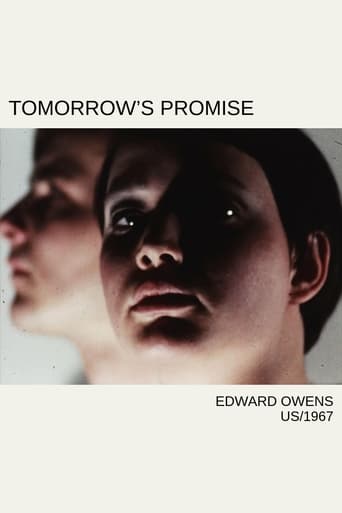Tomorrow’s Promise
6.2
Drama
Rated:
1967
0h45m
On:
Country: United States of America
“Tomorrow’s Promise is a film about vacantness. Which physically does ‘begin’, reversed, upside down on the screen […] suddenly another such position is taken (not in reverse), this time by a male figure and soon, in this same section, the girl of the reversed image reappears posed in a different way; a way obsessed by ‘mood’. Then a technical play of in-the-camera-editing occurs, more intense, brighter than in the first, reversed section. There are several inter-cuts which serve, in this and each subsequent section unto the end, as relative links into the final section: which is actually the ‘story’. The story the protagonist and her hero try to tell in their way is apophysis; except that ‘pictures’, clear visions take the place of words. My film could have been edited with precise tensions and a lucid straight narrative, but it was my aim to ‘re-create’ the protagonist of my personal life.” - Edward Owens “Tomorrow’s Promise is a film about vacantness. Which physically does ‘begin’, reversed, upside down on the screen […] suddenly another such position is taken (not in reverse), this time by a male figure and soon, in this same section, the girl of the reversed image reappears posed in a different way; a way obsessed by ‘mood’. Then a technical play of in-the-camera-editing occurs, more intense, brighter than in the first, reversed section. There are several inter-cuts which serve, in this and each subsequent section unto the end, as relative links into the final section: which is actually the ‘story’. The story the protagonist and her hero try to tell in their way is apophysis; except that ‘pictures’, clear visions take the place of words. My film could have been edited with precise tensions and a lucid straight narrative, but it was my aim to ‘re-create’ the protagonist of my personal life.” - Edward Owens “Tomorrow’s Promise is a film about vacantness. Which physically does ‘begin’, reversed, upside down on the screen […] suddenly another such position is taken (not in reverse), this time by a male figure and soon, in this same section, the girl of the reversed image reappears posed in a different way; a way obsessed by ‘mood’. Then a technical play of in-the-camera-editing occurs, more intense, brighter than in the first, reversed section. There are several inter-cuts which serve, in this and each subsequent section unto the end, as relative links into the final section: which is actually the ‘story’. The story the protagonist and her hero try to tell in their way is apophysis; except that ‘pictures’, clear visions take the place of words. My film could have been edited with precise tensions and a lucid straight narrative, but it was my aim to ‘re-create’ the protagonist of my personal life.” - Edward Owens “Tomorrow’s Promise is a film about vacantness. Which physically does ‘begin’, reversed, upside down on the screen […] suddenly another such position is taken (not in reverse), this time by a male figure and soon, in this same section, the girl of the reversed image reappears posed in a different way; a way obsessed by ‘mood’. Then a technical play of in-the-camera-editing occurs, more intense, brighter than in the first, reversed section. There are several inter-cuts which serve, in this and each subsequent section unto the end, as relative links into the final section: which is actually the ‘story’. The story the protagonist and her hero try to tell in their way is apophysis; except that ‘pictures’, clear visions take the place of words. My film could have been edited with precise tensions and a lucid straight narrative, but it was my aim to ‘re-create’ the protagonist of my personal life.” - Edward Owens



 AD
AD